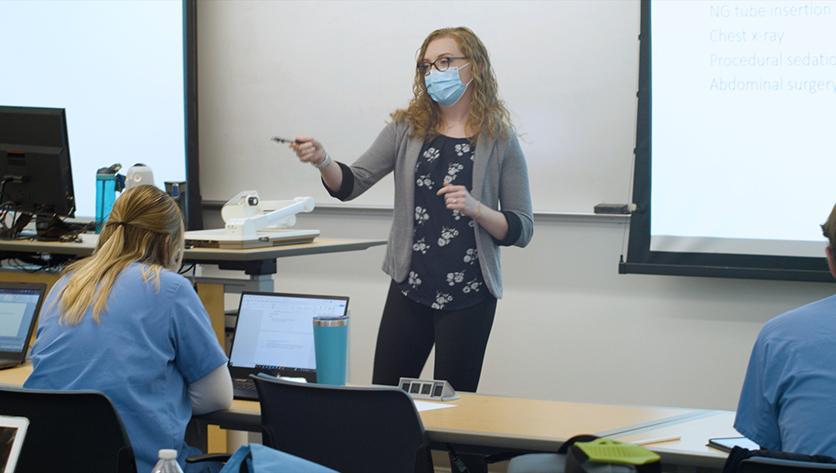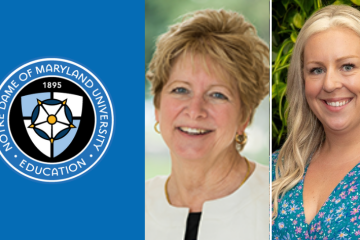NDMU’s New Master’s Offerings Set to Meet Rising National Demand for Nurse Practitioners

By: Erik Pedersen, Senior Communications Manager
BALTIMORE – The demand for nurse practitioners in the United States has increased dramatically in recent years, and that trend is only expected to grow stronger over the next decade. The U.S. Department of Labor projects overall employment for nurse practitioners to grow by 52 percent from 2020 to 2030, a figure which leads all healthcare professions and ranks fourth overall out of 790 occupations examined by the DOL.
Notre Dame of Maryland University’s School of Nursing will be positioned to meet that demand, with new Adult-Gerontology Primary Care Nurse Practitioner and Family Nurse Practitioner master’s programs set to welcome their first students for the fall 2022 semester.
“We’re excited to bring in students that want to improve their reach in the healthcare system and improve their own livelihood in a sustainable way,” said Dr. Rachael Crowe, assistant professor and pediatric nurse practitioner in the School of Nursing and one of four work group faculty members who helped develop the new programs. “We’re hoping that our graduates will be able to give back to the greater Baltimore community. There are a lot of people in the Baltimore area who are in desperate need of healthcare, and our goal is to directly impact the lives of Baltimorians.”
Crowe was joined by Dr. Jane Balkam, interim director for the programs and pediatric nurse practitioner Dr. Bernice Horton-Gee, women’s health nurse practitioner, and Dr. Mary Packard on the development and implementation work group for the School of Nursing at NDMU. Drs. Balkam, Crowe, and Horton-Gee all remain actively practicing nurse practitioners in addition to their faculty roles, giving them a first-hand account of how the role continues to change over time. Nurse practitioners have the ability to manage care for individuals of all ages in primary care settings, helping to fill voids left by a shortage of physicians practicing in that capacity.
“Nurse practitioners have a bit of a hybrid role in that they are certainly using all of their skills and background as a registered nurse, but they also receive additional education and real-time training in how to diagnose and manage the care for common health problems seen among adults and children,” Dr. Balkam explained. “We like to think that we take a broader view of the whole person, assessing how their health issues fit into their whole social living situation. We tend to emphasize educating people about their health condition and why it’s important that they make certain modifications in lifestyle or take certain medications.”
Other nurse practitioner programs are already established at colleges and universities across the surrounding Mid-Atlantic region, but Notre Dame’s offerings have several features that are designed to help them stand out from the rest. As a master’s level program, rather than a doctorate of nursing path taken by some future nurse practitioners, students have the ability to complete their degree at a faster pace while still receiving the full educational experiences required to become certified in the field.
NDMU will also conduct many of its classes in-person, allowing for a more personable learning experience during a time when many graduate degrees have moved totally online. When students progress to their clinical practicum hours, with 750 required for graduation, the School of Nursing faculty and staff will be ready to assist with those placements.
“In many programs, the student has to find their own practicum placement,” Dr. Balkam said. “But we have already started speaking with our long-time clinical partners, and several of them have expressed interest in working with us to provide placements for our students.”
School of Nursing faculty, aided by the fact that so many maintain their clinical practice to go along with their teaching responsibilities, have strong relationships with several local hospitals. Dr. Horton-Gee is a women’s health nurse practitioner at Johns Hopkins Bayview Medical Center, while Dr. Crowe works in the pediatric ICU at the University of Maryland Medical Center.
“One of the strengths of our school is that everything that we’re teaching is very current because so many of us remain in practice,” Dr. Crowe said. “We are constantly changing our curriculum and course content to be reflective of what’s happening in the present. I also base a lot of my case studies on my clinical experiences to make them as realistic as possible.”
Similar to all offerings within NDMU’s School of Nursing, the curriculum for the programs will be grounded in the caring nursing science philosophy, prioritizing the importance of treating people being cared for as whole individuals rather than just patients in need of a diagnosis. The emphasis on caring science, along with Notre Dame’s personalized teaching methods, have led to several alumni returning to campus to enroll in one of the new nurse practitioner programs.
“We have a number of students who are coming back to us, even though they’ve already received a master’s degree in nursing education or nursing administration,” Dr. Balkam said. “And when I ask them why, they talk about how rewarding their previous experience was as a student. They want to come back and get a second master’s because they liked the way that we engage students and our approach to learning. That’s certainly very heartening, to know that previous students feel positive about our school.”
“There’s something special about Notre Dame I think,” Dr. Crowe added. “It’s a very empowering institution – we’re trying to help students reach their goals, and as faculty we care about every single one of them. We know them all by name, and we keep in touch after graduation. It’s like being part of a family, and the students feel that. It’s been really fun seeing alumni come back. It shows us that they’ve gained more than just a degree from here.”
Established in 1895, Notre Dame of Maryland University (NDMU) is a private, Catholic institution in Baltimore, Maryland, with the mission to educate leaders to transform the world. Notre Dame has been named one of the best "Regional Universities North" by U.S. News & World Report.




